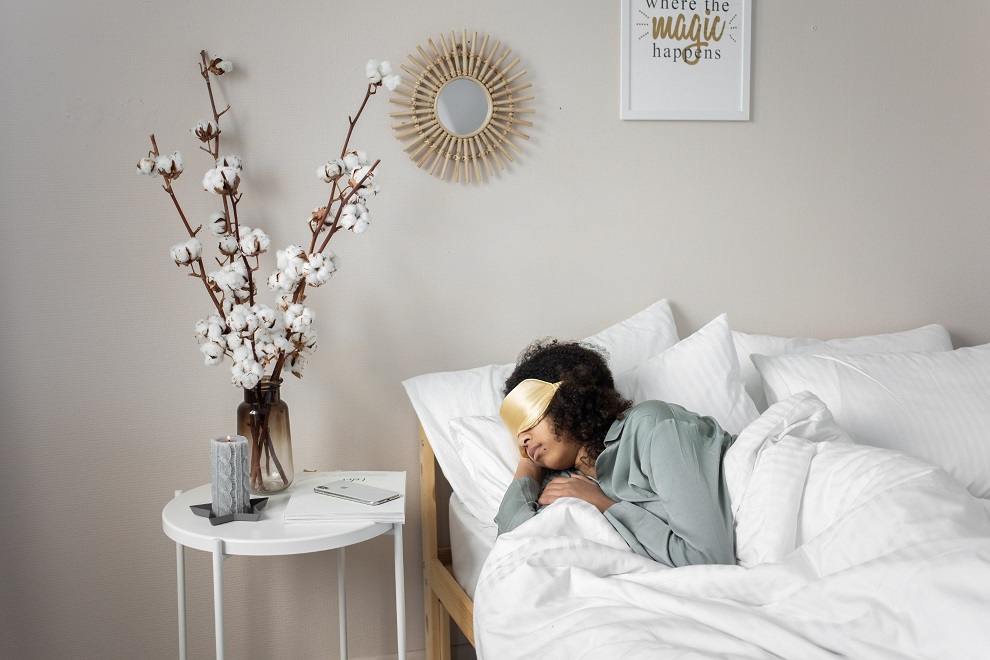
The pursuit of sleep is big business. In fact, Statista predicts that the global sleep industry will be worth 585 billion US dollars by 2024. We’re talking mattresses, luxury bedding, pillows (the pillow market alone was valued at about 15.6 billion US dollars worldwide back in 2019), block-out blinds, soundproofing, supplements and apps. And in a world where people are increasingly dissatisfied with both the quantity and quality of the sleep they’re getting – according to the CDC, one in three Americans are sleep deprived – sleep tourism is one of the hottest trends of the year.
Sleep tourism covers everything from sleep retreats (where people travel to destinations specifically to rest and catch up on sleep) to hotels investing heavily in a guest’s sleep experience.But it’s not just tourists hoping to catch up on some much-needed sleep – the concept of sleep tourism is gaining traction in corporate travel too, with ‘strange bed syndrome’ and erratic sleep patterns no longer accepted as part and parcel of business travel.
Business travellers want to make sure they’re well rested too, and Bonnie Smith, GM Corporate Traveller, says many hotels are working hard to give business travellers a comfortable place to sleep and catch their breath.
“We’re seeing more and more properties invest in the sleep experience, from soundproof rooms to air filtration and temperature control – and delivering a good night’s sleep can set you apart from your competitors,” says Smith.
For Smith, it’s particularly important for frequent fliers. “You don’t need to be a sleep expert to know that long-haul flights, jet lag and a stressful schedule can throw out one’s sleep schedule,” says Smith.
Today’s travellers are more focussed on health, wellbeing and work-life balance than ever before. Globally, bleisure travel – which blends business and leisure travel – is on the rise, as are longer stays as businesses opt for “quality over quantity” when it comes to their trips. And hotels are rising to the challenge, offering everything from extended stay packages to multi-purpose gathering spaces and tours and excursions to add value (and much-needed downtime) to a trip.
In other words, the days of old-school business trips are over. Where possible, travellers want to prioritise flexibility (including where, when and how they work), health and mental wellbeing.
And yet, explains Smith, for SMEs trying to make ends meet and grow their business, health and wellbeing often falls to the bottom of the list of priorities. This is where travel management companies (TMCs) come in.
“A TMC can help you create a ‘health-centric’ travel policy, in other words, one which supports a happy, well-rested and productive team,” says Smith. “Examples include securing the best rates for premium-class bookings on long-haul flights (where sleep is at least a possibility); identifying hotels, guesthouses or serviced apartments which suit your travellers’ needs; and negotiating certain travel perks on your behalf, including lounge access for longer layovers.”
Rather than writing off the possibility of a decent night’s sleep on a business trip, says Smith, actually prioritising it leads to increased energy, performance and productivity and happier travellers all round.
And, with a little forethought, it’s not that hard. Here are just a few ways travellers can maximise their chances of a good night’s sleep while out on the road:
Book the right accommodation. TMCs have the widest choice of accommodation available, so chat to your travel manager about different options. And with their experience they’ll know exactly which properties have comfortable bedding, soundproofing and the like – as well as which rooms to book and which rooms to avoid (next to housekeeping or the lift!).
Another consideration, says Smith, is location. “Often travel bookers look for the cheapest option available, but with our expertise and buying power we can often suggest central options which don’t require your travellers getting up at 5am to avoid the traffic!”
Give long-haul travellers extra love. It’s not just time zones and jet lag that cause havoc with one’s sleep – long haul flights alone are tough. Consider booking premium-class seats if budget allows, and offer travellers an extra day in their destination to catch up on sleep – or a policy-sanctioned duvet day on their return.
Allow for downtime. Be mindful of booking back-to-back meetings alongside evening events and on-the-go itineraries. Downtime gives travellers a chance to rest and recharge – whether they choose to close the (block-out) curtains and snooze or explore their destination.
Support sleep promoting activities. Create an environment where travellers are able to put their electronic devices down, grab a yoga mat (many hotels now provide yoga mats and gym equipment), eat well and prioritise their own wellbeing.
For Smith, the sleep trend is simply going to grow in popularity.
“While it might sound a little ‘kooky’ or out there, hotels are definitely investing in the entire sleep experience. We’re reading about everything from ‘sleep menus’ designed to help people sleep better at night to room ‘mists’ and enhancers, lavender on the pillow and soundproof windows. But honestly, if a traveller experiences a good night’s sleep while away on business, they’ll keep coming back. It’s in a hotel’s best interest to woo tired travellers – and for a business’s travel policy to support each traveller’s health and wellbeing.
About Corporate Traveller
Corporate Traveller is a division of the Flight Centre Travel Group, dedicated to saving businesses across Southern Africa time and money. Corporate Traveller has the benefit of being part of the world’s third-largest travel retailer, leveraging its global negotiating strength. It has access to over 50 of the world’s leading airlines and deals with more than 100 000 hotels around the world to guarantee savings for clients. Corporate Traveller provides clear, consolidated reporting of all its clients’ travel activities, helping them to control travel spend and identify opportunities to save costs.
Issued by: Big Ambitions



























